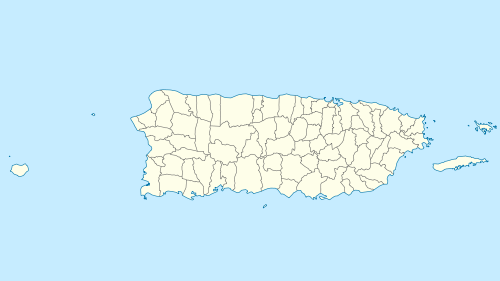Museo del Autonomismo Puertorriqueño
.jpg) Museo del Autonomismo Puertorriqueño in Barrio Segundo | |
 Museo del Autonismo Puertorriqueño Location within Puerto Rico | |
| Established | 7 September 2006[1] |
|---|---|
| Location |
Panteón Nacional Román Baldorioty de Castro |
| Coordinates | 18°0′14″N 66°37′1″W / 18.00389°N 66.61694°WCoordinates: 18°0′14″N 66°37′1″W / 18.00389°N 66.61694°W |
| Type | Political history museum |
| Curator | Dra. Neysa Rodríguez Deynes[1] |
| Owner | Ponce Municipal Government |
The Museo del Autonomismo Puertorriqueño (English: Museum of Puerto Rican Autonomism) is a small museum in Ponce, Puerto Rico, that showcases the political history of Puerto Rico with an emphasis on the contributions made by the municipality of Ponce and its residents. The museum was established on 7 September 2006.[2]
History
The museum was established in 2006 under the municipal administration of Mayor Francisco Zayas Seijo.[3]
Location
The museum is located within the grounds of the Panteón Nacional Román Baldorioty de Castro (English: Román Baldorioty de Castro National Pantheon). The Panteon is a tract of land in Barrio Segundo of the city of Ponce, Puerto Rico, originally designed as the city's cemetery, but later converted into what has come to be a famous burial place. Established in 1842, it is Puerto Rico's first (and only) national pantheon.[4][5] It is the only cemetery dedicated as a museum in Puerto Rico and the Caribbean.[6] The pantheon, and its Museum of Puerto Rican Autonomism, is located at Number 1 Calle Torres at Calle Frontispicio in Barrio Segundo, Ponce.[7]
Objective
.jpg)
The purpose of the museum is to trace the history of autonomism in the Island.[8] In 2009, the municipality also commissioned the Pontifical Catholic University of Puerto Rico School of Architecture to perform a study to determine the viability and cost for the total reconstruction of the Pantheon.
Collections and displays
The museum has three main permanent collections. The first one portrays Puerto Rico's quest for national autonomy during the 19th century. The second collection displays Puerto Rico's national autonomy during the 20th century, and the third wing is dedicated to the autonomy of the Ponce municipal government.[1] Each display area pinpoints the role of the city of Ponce as the cradle of Puerto Rican autonomism, in particular, the Executive Orders of former governor Rafael Hernández Colón in the development of national autonomism during the second half of the twentieth century, and his leading role of the establishment of Puerto Rico's Law of Autonomous Municipalities of 1991 and the development of municipal autonomy.[1]
Significance

The cemetery adjacent to the museum distinguishes itself because various illustrious Puerto Ricans of transcendental importance are buried here. The most important personage buried in this historic cemetery is Don Ramon Baldorioty de Castro, distinguished Puerto Rican patriot, journalist, educator, writer, orator, and abolitionist. In 1870, he was elected delegate to the Courts of Cadiz, where he attacked the slavery system of the time, being responsible for most of the liberty amendments. Afterward, on March 23, 1873, the abolition of slavery was proclaimed, being Baldorioty de Castro responsible for such proclamation. He is known as the father of Puerto Rican autonomism.[9] The late mayor of Ponce, Churumba, also an autonomist, has a mausoleum here also.[10] The remains of nationalist heroe Casimiro Berenguer are buried here as well.[11]
See also
References
- 1 2 3 4 Museo del Autonomismo Puertorriqueño. Pontificia Universidad Catolica de Puerto Rico. Retrieved 16 July 2012.
- ↑ Museo del Autonomismo Puertorriqueño. Fundacion Biblioteca Rafael Hernandez Colon. Retrieved 16 July 2012.
- ↑ Museo del Autonomismo Puertorriqueño. Gobierno Municipal de Ponce. Museo del Autonismo Puertorriqueño (Puerto Rican Autonomism Museum), Panteon Nacional Roman Baldorioty de Castro, Ponce, Puerto Rico. Accessed November 10, 2010
- ↑ The World of 1898, The Spanish-American War
- ↑ Aproximación a la iconografía funeraria en Puerto Rico: Análisis de Tumbas y Pinturas Puertorriqueñas Representativas de Finales del Siglo XIX al Inicio del XXI. Doctoral Thesis. By Doris E. Lugo Ramirez. ISBN 978-84-691-7947-5. Universidad de Sevilla, Sevilla, España. 2008. Page 112.
- ↑ Juan Alindato y Chegüi Torres al Panteon Nacional Roman Baldorioty de Castro, nuestro cementerio museo. Periodico "La Voz de la Playa de Ponce", Edicion 131, October 2010. Page 2.
- ↑ Panteón Nacional Baldorioty De Castro y Museo del Autonomismo Puertorriqueño. Puerto Rico Association of Museums. Retrieved 16 July 2012.
- ↑ Cine y jazz en el Panteón Román Baldorioty de Castro de Ponce. El Sur a la Vista. 13 September 2011. Retrieved 4 October 29011.
- ↑ State Historic Preservation Officer, Certifying Official; Armando Morales Pares, Architect, Puerto Rico Historic Preservation Office. (San Juan, Puerto Rico) November 25, 1983. In National Register of Historic Places Inventory - Nomination Form. United States Department of the Interior. National Park Service. (Washington, D.C.) Page 3. Listing Reference Number 84003149. January 5, 1984.
- ↑ Bonnin Orozco Architects (Ponce, Puerto Rico). Public Spaces Projects. Mausoleo Rafael Cordero Santiago.
- ↑ Panteon Nacional Roman Baldorioty de Castro. Official Website of the Autonomous Municipality of Ponce. Retrieved 16 July 2012.
External links
18°0′57″N 66°37′4″W / 18.01583°N 66.61778°W